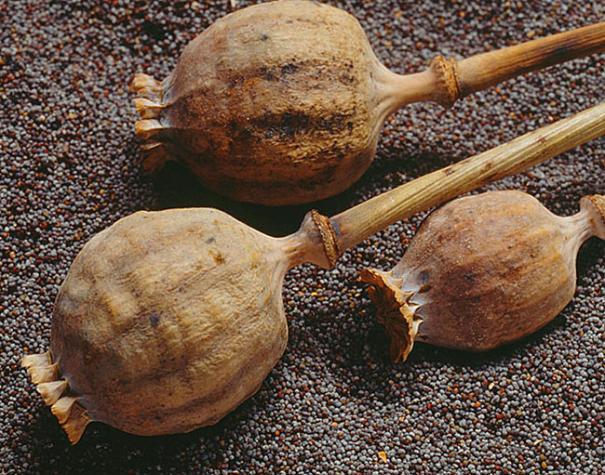In the cold winter moon, there is no cold that a hot pot cannot dispel. With the addictive spicy hot pot, there is a topic that will be brought up every year: the hot pot is so tempting and fragrant, is it poppy shells added to the bottom of the pot? Can poppy husks really increase the umami taste of food? Can poppy be used as a food condiment?

Poppy husks
In fact, people's concerns about adding poppy shells to catering companies are not unreasonable. Long-term consumption of foods containing poppy husks is addictive, can also cause damage to the human nervous system, and may cause chronic poisoning. These negative effects are mainly caused by the alkaloids in the poppy husk, which contain morphine, codeine, papaverine, tibaine, nacotin and other alkaloids, the most well-known of which are morphine, codeine and papaverine, which have the highest content of alkaloids in the poppy husk.
The main alkaloid substance in the poppy husk
Morphine derivative "morphine hydrochloride" is a commonly used clinical anesthetic, has a strong analgesic effect, it can also be used as analgesic, antitussive and antidiarrheal agent, but its biggest drawback is easy to become addictive; morphine diacetate is the notorious drug heroin. Codeine also has antitussive and analgesic effects, and its effect is stronger than that of general antipyretics and analgesics, and weaker than morphine. Papaverine can mainly relieve spasm of smooth muscle, especially vascular smooth muscle, and can inhibit the excitability of the myocardium, and its hydrochloride can treat angina and arterial embolism. These several alkaloids in poppy husks have different degrees of addictiveness; although the content in poppy husks is not as high as in poppy juice and leaves, long-term consumption will pose a danger to human health.
Since it contains addictive ingredients, why add poppy husks to food? Can poppy husks really increase the umami taste of food? In fact, this statement has been refuted many times by various experts. The poppy husk itself does not have any taste, and has a slightly sour and bitter taste; therefore, the phrase "using the poppy husk to enhance the taste" will not make sense at all.
There is also another saying on the Internet: "The addition of poppy shells to food is to prevent diarrhea, because poppy shells have anti-diarrhea effects, and the addition of poppy shells is mostly hot pot, which is easy to cause diarrhea." "It is true that poppy husks have anti-cough and anti-diarrhea drug effects, and are also allowed by the state to be pharmaceutical ingredients, and they contain the ingredients of poppy husks in a variety of cough medicines. However, the use of poppy hulls requires strict dosing. For this requirement, it is not possible to add food to food by food enterprises. As a result, national regulatory authorities explicitly prohibit the addition of poppy husks to food.
Although poppy husks are explicitly prohibited from being added to food as a condiment, poppy seeds are a widely used seasoning around the world. Poppy seeds are not addictive, and contain a large number of aldehydes, furanones, pyrazines, limonene, butyl isobutyrate and other spicy flavor related compounds, which are widely used in pastry spices in Europe and the United States. According to media sources, in 2015, US President Barack Obama had "poppy seed bread and cream pudding and lemon lychee smoothies" on the menu of the state dinner reception of President Xi Jinping. In addition to being a spice, poppy seed oil, a by-product of poppy seeds, is also widely used in food. Millet seed oil contains a variety of vitamins, trace elements and rich in polysaccharides, polypeptides, alcohols, flavonoids and other natural substances, as well as more than a dozen kinds of unsaturated fatty acids and amino acids that are essential to the human body but cannot be synthesized by themselves, which have a "miraculous effect" on good health.
According to legend, this miraculous effect of poppy seeds was well known in the Sui and Tang dynasties. After the poppy was introduced to China, it was cultivated in Gansu, Yunnan and other places, and the poppy seeds were mainly used to cook porridge and rice, or to squeeze oil from it. Over time, the farmers of the planting area discovered that poppy seed oil had many miraculous effects on good health, and the local officials regarded it as a precious treasure for the emperor's royal use, and many imperial doctors used it as a panacea. The name "royal rice" of poppy seeds is derived from this. On June 6, 2006, the Ministry of Health approved "Royal Rice Oil" (Poppy Seed Oil) as a food market, and this natural green rare vegetable oil with great nutritional value was finally "banned". But in order to control poppy seeds as necessary, domestic regulators only allow poppy seeds to be used as oil, and still prohibit their use in other food condiments; so if you want to taste poppy seed-flavored pastries, you may have to wait until you travel to Europe and the United States.
Although the opium poppy has brought heavy memories to our country as a raw material for opium, it has brought people not only drugs, but also medicine, more delicious food, and very beautiful and pleasant aroma of poppies. Poppies are innocent and need the right way we use them.